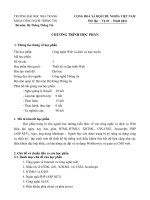Chương 1 : môn hệ thống thông tin QL
Bạn đang xem bản rút gọn của tài liệu. Xem và tải ngay bản đầy đủ của tài liệu tại đây (1009.79 KB, 49 trang )
HỆ THỐNG THÔNG TIN QUẢN LÝ
Chương 1
Sự cần thiết và vai trị của
Hệ thống thơng tin quản lý
1-1
“But Today, They’re Not Enough.”
• Jennifer Lacks Skills Falcon Security Needs:
1.
2.
3.
4.
Abstract reasoning skills.
Systems Thinking Skills.
Collaboration Skills.
Experimentation Skills.
1-2
What Do Employers Want?
• Self starter, Don’t wait to be told what to do.
• Team worker
–Develops ideas with others.
–Asks questions.
–Pulls more than their own weight.
1-3
Study Questions
Q1-1 Why is Introduction to MIS the most important class in
the business school?
Q1-2 How will MIS affect me?
Q1-3 What is MIS?
Q1-4 How can you use the five-component model?
Q1-5 What is information?
Q1-6 What are necessary data characteristics?
Q1-7 2027?
1-4
The Digital Revolution
Q1-1 Why is Introduction to MIS the most important class in the business school?
• Technology fundamentally changing business.
• Information Age
–Production, distribution, control of information
primary economic drivers.
• Digital Revolution
–From mechanical/analog devices to digital devices.
1-5
Understanding the Forces Pushing the
Evolution of New Digital Devices
Q1-1 Why is Introduction to MIS the most important class in the business school?
• Bell’s Law
–New class of computers establishes a new industry
each decade.
New platforms, programming environments,
industries, networks, and information systems.
• Understand how next digital evolution will affect
businesses.
• What an industry does and how it does it will
change.
1-6
Computer Price/Performance Ratio
Historical Trend
Q1-1 Why is Introduction to MIS the most important class in the business school?
Figure 1-1 Computer Price / Performance Ratio Decreases
1-7
Metcalfe’s Law
Q1-1 Why is Introduction to MIS the most important class in the business school?
• Network value equal
to square of number
of users connected
to it. (V=U2)
– Google, Amazon,
eBay exist due to
large numbers of
Internet users.
Figure 1-2 Increasing Value of Networks
1-8
Fundamental Forces Changing Technology
Q1-1 Why is Introduction to MIS the most important class in the business school?
Law
Meaning
Implications
Moore’s Law
The number of transistors per
square inch on an integrated chip
doubles every 18 months.
Computers are getting exponentially faster.
The cost of data processing is approaching
zero.
Metcalfe’s Law
The value of a network is equal to
the square of the number of users
connected to it.
More digital devices are being connected
together.
The value of digital and social networks is
increasing exponentially.
Nielsen’s Law
Network connection speeds for
high-end users will increase by 50
percent per year.
Network speed is increasing. Higher
speeds enable new products, platforms,
and companies.
Kryder’s Law
The storage density on magnetic
disks is increasing at an
exponential rate.
Storage capacity is increasing
exponentially.
The cost of storing data is approaching
zero.
1-9
Price of Storage Capacity per GB
Q1-1 Why is Introduction to MIS the most important class in the business school?
Figure 1-4 Price of Storage Capacity per GB
1-10
This Is the Most Important Class in the
School of Business Because You Will Learn:
Q1-1 Why is Introduction to MIS the most important class in the business school?
• How technology fundamentally changes
businesses.
• Why executives try to find ways to use new
technology to create a sustainable competitive
advantage.
• Assess, evaluate, apply emerging information
technology to business.
• Help you attain knowledge needed by future
business professionals.
1-11
Technological Change is Accelerating
Q1-2 How will MIS affect me?
• Bell’s Law
–Today’s highly successful business could be
bankrupt quickly because technology changed and
it didn’t.
• Example: Blockbuster
–In 2004 Blockbuster had $5.9B in revenues
–In 2010 Blockbuster filed for bankruptcy
–High-speed network connections and streaming
video changed the competitive landscape
1-12
How Can I Attain Job Security?
Q1-2 How will MIS affect me?
• Moore’s Law, Metcalfe’s Law, and Kryder’s Law
–Driving data processing, storage, communications
costs to essentially zero.
• Any routine skill can, and will, be outsourced to
lowest bidder.
1-13
What Skills Will Be Marketable During
Your Career?
Q1-2 How will MIS affect me?
• Rapid technological change and increased
international competition:
–Requires skills and ability to adapt.
–Favors people with strong non-routine cognitive
skills.
–Message: Develop strong non-routine cognitive
skills.
1-14
What Is a Marketable Skill?
Q1-2 How will MIS affect me?
Example
Jennifer's Problem at Falcon
Security
Abstract Reasoning
Construct a model or representation.
Hesitancy and uncertainty when
conceptualizing a method for
identifying 3D printable drone parts.
Systems Thinking
Model system components and
show how components’ inputs and
outputs relate to one another.
Inability to model Falcon Security’s
operational needs.
Collaboration
Develop ideas and plans with others.
Provide and receive critical
feedback.
Unwilling to work with others on workin-progress.
Ability to Experiment
Create and test promising new
alternatives, consistent with
available resources.
Fear of failure prohibited discussion of
new ideas.
Skill
Figure 1-5 Examples of Critical Skills for Nonroutine Cognition
1-15
How Can Intro to MIS Help You Learn
Non-Routine Skills?
Q1-2 How will MIS affect me?
• Abstract Reason
–Ability to make and manipulate models.
–Learn to use and construct abstract models.
–Ch. 1: Five components of an IS model.
–Ch. 5: How to create data models.
–Ch. 10: How to make process models.
1-16
How Can Intro to MIS Help You Learn
Non-Routine Skills? (cont’d)
Q1-2 How will MIS affect me?
• Systems Thinking
–Ability to model system components, connect inputs
and outputs among components to reflect structure
and dynamics.
–Ability to discuss, illustrate, critique systems;
compare alternative systems; apply different
systems to different situations.
1-17
How Can Intro to MIS Help You Learn
Non-Routine Skills? (cont’d)
Q1-2 How will MIS affect me?
• Collaboration
–People working together to achieve a common goal,
result, or work product.
–Ch. 2 discusses collaboration skills and illustrates
several collaboration information systems.
1-18
How Can Intro to MIS Help You Learn
Non-Routine Skills? (cont’d)
Q1-2 How will MIS affect me?
• Ability to Experiment
–Make reasoned analysis of an opportunity; develop
and evaluate possible solutions.
“I’ve never done this before.”
“I don’t know how to do it.”
“But will it work?”
“Is it too weird for the market?”
• Fear of failure paralyzes many good people
and ideas
1-19
Jobs
Q1-2 How will MIS affect me?
• 69% of college graduates need additional training
or education.
• 46% working in jobs not requiring their degree,
underemployed.
• Better success for students with courses related to
information systems.
• Tradable job
–Job not dependent on particular location, can be
offshore outsourced.
1-20
Job Growth By Sector Over the Past Twenty
Years
Q1-2 How will MIS affect me?
Figure 1-6 Growth of Jobs by Sector from 1989 to 2009
1-21
BLS Occupational Outlook 2014-2024
2012 Median Pay 2014 Median Pay Job Growth (%) 2014-24 Job Growth (N) 2014-24
Business Managers
Marketing Managers
Information Systems Managers
Financial Managers
Human Resources Managers
Sales Managers
Computer and Information Technology
Computer Network Architects
Computer Systems Analysts
Database Administrators
Information Security Analysts
Network and Systems Admin.
Software Developers
Web Developers
Business Occupations
Accountants and Auditors
Financial Analysts
Management Analysts
Market Research Analysts
Logisticians
Human Resources Specialists
$
$
$
$
$
115,750
120,950
109,740
99,720
105,260
$
$
$
$
$
123,450
127,640
115,320
102,780
110,660
9%
15%
7%
9%
5%
19,700
53,700
37,700
10,800
19,000
$
$
$
$
$
$
$
91,000
79,680
118,700
87,170
72,560
93,350
62,500
$
$
$
$
$
$
$
98,430
82,710
80,280
88,890
75,790
97,990
63,490
9%
21%
11%
18%
8%
17%
27%
12,700
118,600
13,400
14,800
30,200
186,600
39,500
$
$
$
$
$
$
63,550
76,950
78,600
60,300
72,780
55,640
$
$
$
$
$
$
65,940
78,620
80,880
61,290
73,870
57,420
11%
12%
14%
19%
2%
5%
142,400
32,300
103,400
92,300
2,500
22,000
Figure 1-7 Bureau of Labor Statistics Occupational Outlook 2014–2024
1-22
Bottom Line of MIS Course
Q1-2 How will MIS affect me?
Most important course in business school because:
1. Gives background needed to assess, evaluate,
and apply emerging information systems
technology to business.
2. Gives marketable skills by helping you learn
abstraction, systems thinking, collaboration, and
experimentation.
3. Makes you aware of well-paying, high demand
MIS-related jobs.
1-23
Management Information Systems
Q1-3 What is MIS?
• Key elements
1. Management and use
2. Information systems
3. Strategies
• Goal of MIS:
Managing IS to achieve business strategies.
1-24
Management Information Systems (cont’d)
Q1-3 What is MIS?
• Management and use to:
–Develop, maintain, adapt by:
Creating an information system that meets your
needs, take an active role in system’s development.
Why?
Business professionals using cognitive skills to
understand business needs and requirements.
1-25









